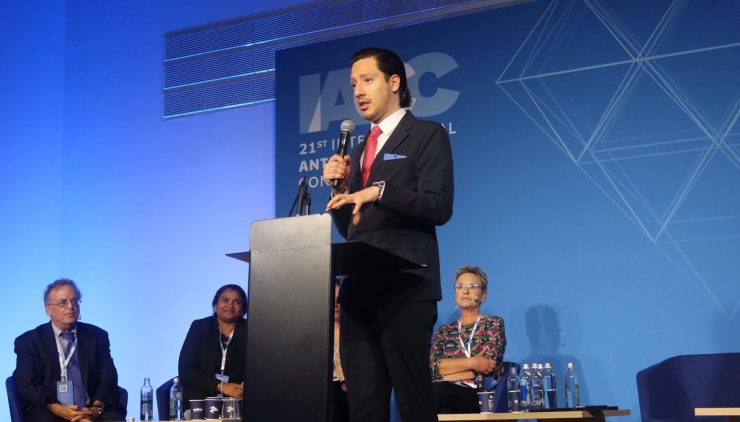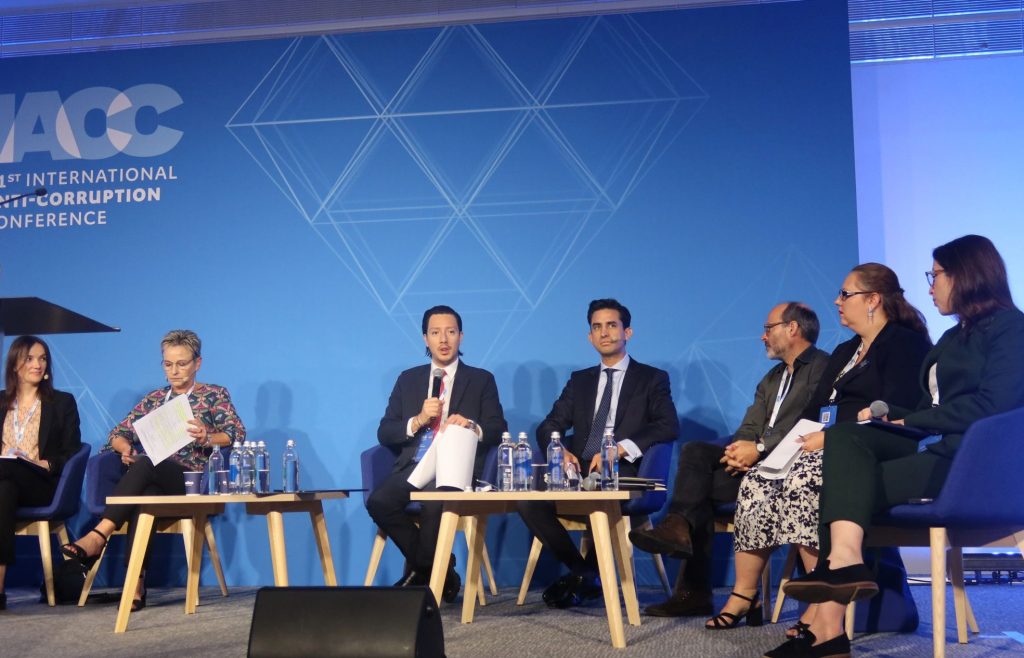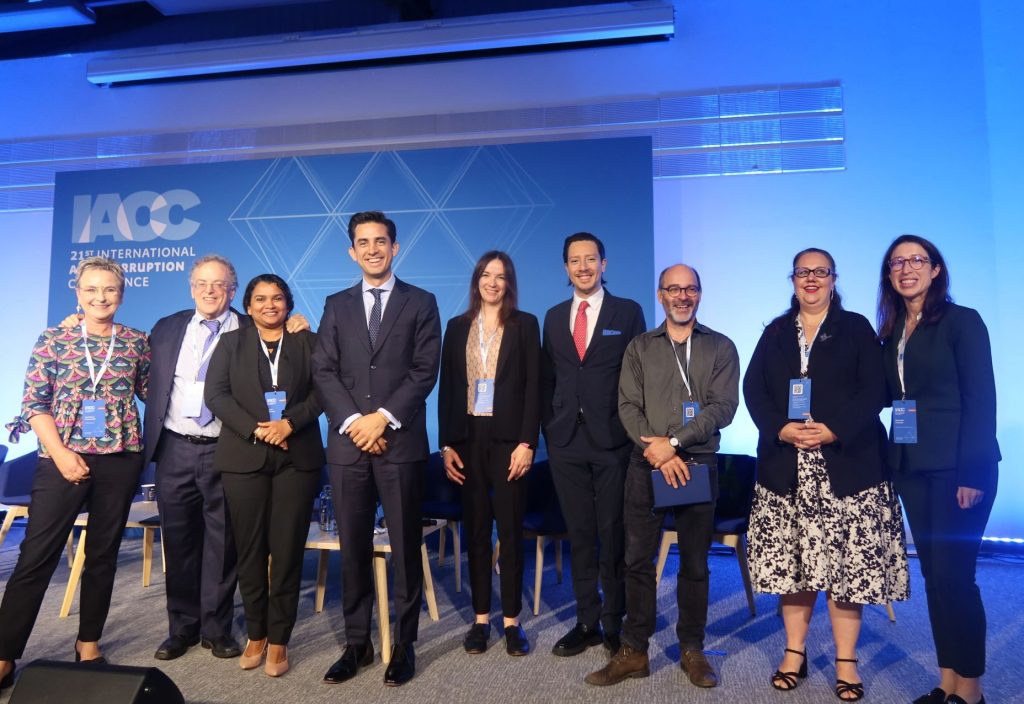Vance Center Moderates Panel on Whistleblower Protection at IACC 2024
June 2024Associate Executive Director Jaime Chávez Alor moderated a panel on legal protection frameworks for whistleblowers during the International Anti-Corruption Conference, held in June in Vilnius, Lithuania.

Associate Executive Director Jaime Chávez Alor presents a panel on legal protection frameworks for whistleblowers during the International Anti-Corruption Conference in Vilnius, Lithuania, June 19, 2024. Photo credit: IACC
The panel, “From Silence to Safety: Strengthening Legal Protection Frameworks to Empower Whistleblowers,” featured insight from eight experts on opportunities and challenges related to whistleblower protection laws and mechanisms around the world.
Speakers covered whistleblower protection laws from Mexico to the Maldives, and offered analysis of international standards, areas for improvement, best practices and next steps for policy and advocacy after the conference. Recommendations from the session included continued technical assistance to countries to improve whistleblower reporting and protection mechanisms, developing and implementing new legal frameworks that are sensitive to local contexts and use thoughtful language, clarifying the definition of a whistleblower, strengthening implementation of existing laws, and educating potential whistleblowers and government officials about relevant transnational laws.
Carlos G. Guerrero Orozco, co-founder and President of Derechos Humanos y Litigio Estratégico Mexicano, opened the discussion. He emphasized that including intentional vocabulary and specific definitions for whistleblowers in new legal frameworks is key to transforming the concept of whistleblowing, especially in places like Mexico, where the common term for “whistleblower” has a negative connotation. However, he pointed out that language alone does not protect whistleblowers, and governments must do more to encourage reporting and protect those who come forward.
Liezl Groenewald, CEO of The Ethics Institute & co-founding director of Whistleblowers House in South Africa, outlined three goals of whistleblower legislation: encouraging reporting, protecting whistleblowers, and spurring investigation. She observed that many countries in Africa afford little protection to whistleblowers, who often fear retaliation, and provided examples of different existing frameworks in Namibia, Uganda, and Kenya.
Marie Terracol, Whistleblower Protection Lead at Transparency International, reviewed the impact of the EU Directive, which was adopted in 2019 and sets minimum standards for all EU member states, and outlined its strengths and ongoing issues, such as lack of compliance and a narrow scope of who qualifies as a whistleblower.
Asiath Rilweena, Executive Director of Transparency International Maldives, shared TI Maldives’ efforts to support a whistleblower bill, passed in 2019. She summarized the positive aspects of the law but noted a lack of political will by institutions to implement and comply with the act.

Panelists discuss legal protection frameworks for whistleblowers during the International Anti-Corruption Conference in Vilnius, Lithuania, June 19, 2024. Photo credit: IACC
Louise Portas, Crime Prevention and Criminal Justice Officer with the Corruption and Economic Crime Branch of the UNODC in Vienna, presented the definition of whistleblowers under Article 33 of the UN Convention Against Corruption (UNCAC), and ongoing efforts under UNCAC to continue providing countries with resources to improve their frameworks. She cautioned about confusion arising from conflating whistleblowers and witnesses, and highlighted the need to clarify who legally qualifies as a whistleblower as countries develop their frameworks.
Samantha Feinstein, Staff Attorney and the Director of the International Program at the Government Accountability Project described a “global revolution” in whistleblowing that accelerated during the COVID-19 pandemic as the life-or-death importance of transparency, accountability, and reporting became clear; and a corresponding rise in suppression of free speech around the world. She noted that about 170 countries have some form of a whistleblower law, and highlighted some general trends, including a lack of internal reporting protection laws. She concluded with a call for more action and technical assistance support, adequate funding for independent investigative agencies, and for the private sector to step up where governments are failing.
Wim Vandekerckhove, Professor of Business Ethics at EDHEC Business School in France, outlined existing operational standards and best practices for whistleblowing, published by the International Organization for Standardization (ISO). While a small set of companies do a good job with internal reporting, and another small percentage have reporting structures deliberately designed to impede accountability and deter whistleblowers, he said, the majority of companies have good intentions but ineffective internal reporting practices, and would benefit from using the ISO guidelines.
Stephen Kohn, founder and Chairman of the Board of the National Whistleblower Center, maintained that powerful transnational laws in the United States have been critical to changing the risk dynamic for whistleblowers and holding corrupt entities accountable. The strong protections offered by these laws, which cover four areas – bribery of government officials, money laundering, commodities fraud, and securities fraud – have mobilized whistleblowers to come forward with valuable information. He recommended that the United States enhance guidance about existing protections, emphasizing that education is necessary to help protect potential whistleblowers.
“As an anti-corruption community, we cannot sit on the sidelines. People need to know how these laws work,” he said.
Audience input noted the role of whistleblowers as human rights defenders, and the need to pay attention to enforcement mechanisms and who has enforcement power, to ensure the authorities responsible for carrying out these protections are not the same ones engaging in retaliation. Commenters also pointed to the crucial role of civil society groups in getting effective laws passed, ensuring they are designed with an understanding of local power dynamics and ensuring accountability.
The Vance Center’s Institutional Integrity Program has published several resources on whistleblower protection in multiple countries in Latin America and at the international level:
- Review of International Standards for whistleblower protection (in English and Spanish)
- Comparative analysis of whistleblower protections in Latin America (in Spanish)
- Analysis of whistleblower protections in Argentina, Colombia, and Mexico (in Spanish)
- And more available here

Panelists and moderator, Vance Center Associate Executive Director Jaime Chávez Alor, following the panel at the International Anti-Corruption Conference in Vilnius, Lithuania, June 19, 2024. Photo credit: IACC

